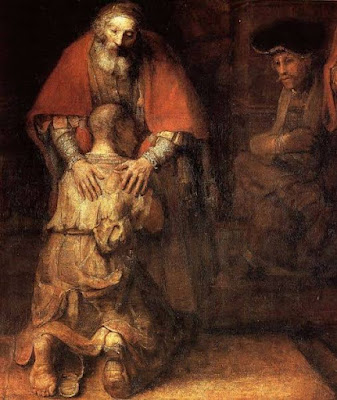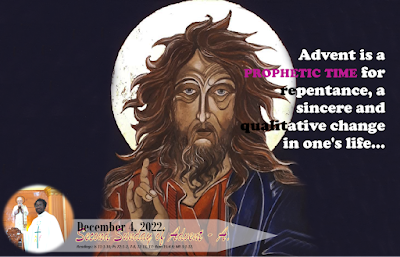GOD OF MERCY AND LOVE.
September 11, 2022.
Twenty-fourth Sunday in Ordinary Time – C.
Readings: Ex 32:7-11, 13-14; Ps 51:3-4, 12-13, 17, 19; 1 Tm 1:12-17; Lk 15:1-32.“This man welcomes sinners and eats with them.” Lk 15:2
A Chinese proverb says: “Repentance is the spring beneath our virtues.” And a Latin proverb adds: “He who sins when drunk will have to atone for it when sober.”
Among all the attributes of our God, the ones we are most pleased to speak about are his Love and Mercy. Our God is a merciful and loving Father who counts not the downfalls or sins of his children, but is always eager to welcome them and reconcile them to him. Sin leads us away from God. Mercy brings us back to him.
Mercy is not something one can say he merits. It is rather the outpouring of God's love, a love we do not deserve, because poor sinners. We honor and worship a God who loves without taking merits into account and who delights more on our conversion than our lost into sin.
Today's readings are a litany of God's mercy and love. In the first reading, we are given to see a God who out of love and faithfulness to his promises, forgives idolatry. The children of Israel, a people he saved from slavery and brought out from Egypt out of love and through wonders, has turned away from him, erected idols and worshiped it. In his anger, he decided to destroy them. But Moses pleaded on their behalf. God then spared them. We read that "the Lord repented of the evil which he thought to do to his people." God's mercy and forgiveness are without conditions. He does not count our merits. If that was the case, never will anyone be forgiven. Rather, his mercy is only led by his love.
The Gospel leads us into the greatest expression of God's mercy. The Lord Jesus gives three beautiful parables that give us to pierce the depth of God's mercy. The lost and found sheep, the lost and found coin, and the lost and found son. What is a little and stubborn sheep that one should sacrifice 99 for it? What is a single coin that one should waste time and energy for it when having nine others? Or more, what is murderer or patricide son, a son who deliberately decides to kill his father though still alive, asking for hereditary and going for a life of debauchery that one should organize a feast for his return? The answer is unique: Nothing. But love and mercy are that which brings from nothingness to something. Our lives are meaningless because of our sins but God's mercy give sense to our existence.
The parable of the prodigal son, among these three parable given by Jesus is the summit of love and mercy. It shows a son who after committing the greatest evil, comes to his senses, enters into a state of sincere contrition and make the journey toward forgiveness. Sincere contrition, that is the only condition to be open to God's merciful love.
On the other hand, we have a father who counts not evil, but who fills with love await the return of the sinner. And who out of love welcomes us back and offers a banquet for our conversion. That is actually what God does for us every time we turn away from sin. This parable is the best explanation of the different steps we go through celebrating the Sacrament of Reconciliation. Coming to the sacramental confession, we come like the prodigal son, loaded and disfigured by the weight of our sins. Fearful for what could be the penitence, but also hopeful to be welcomed by a loving and forgiving father. And God, on the other side stands, not as a judge, but as a compassionate Father eager to embrace and restore his sinful children in their dignity that they lost through sin: New cloth, ring, and calf of the rejoicing. As Jesus says in the Gospel, “there will be more joy in heaven over one sinner who repents than over ninety-nine righteous people who have no need of repentance.” For, though God hates sin, he loves the sinner and wants him saved. God rejoices more on our repentance than on our damnation.
Another element of this parable is the situation with the elder son. He represents those who take offense on why God forgives sinners. For them, the sinner deserves nothing but death. He should not be forgiven. What they forget is that the sinner is their brother. And not only so, they too are sinners in need of conversion and mercy.
Paul gives the example based on his own experience. He has been forgiven to become instrument of forgiveness. We too must find ourselves in that situation. God shows us his mercy so that we should show mercy to others as well.





Comments
Post a Comment